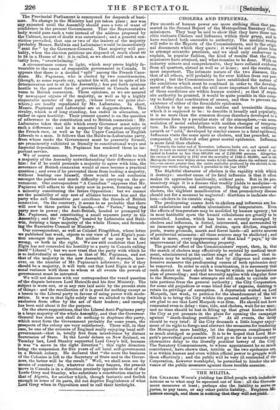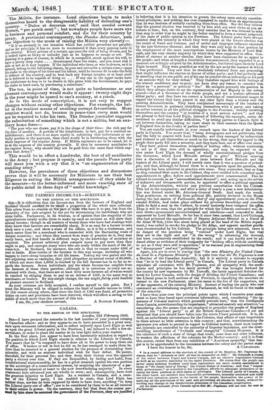THE MILITIA.
SIR CHARLES WOOD'S yielding has filled people with indefinite notions as to what may be squeezed out of him : all the Govern- ment measures at least ; perhaps also the liability to serve on juries, to pay taxes, or any other public liability. Frighten Mi- nisters enough, and there is nothing that they will not yield. The Militia, for instance. Loud objections begin to make themselves heard to the disagreeable liability of defending one's co u n y . " Dulce et decorum est," said that candid coward Horace, "pro patria mori" ; but nowadays people have more eye to business and personal comfort, and die for their country by proxy. A provincial contemporary, the Dundee Advertiser, putts one objection to the mode of raising the Militia very cleverly— it is an anomaly in our taxation which has neither precedent nor parallel; and as for principle, it has no more to recommend it than every gaming-table in the country. Every artisan of a certain age runs the risk of being drawn, and he is looked upon as lucky or unlucky just as he happens to escape or not. The drawing is a game of chance, in which he is compelled, much against his will, to have a pretty deep stake. .. . . Government fixes the stake, and you must risk it side or not as it may happen. If the individual who loses, or who is drawn, as it is termed, belong to the labouring classes, he goes and serves for a certain time,—pays his stake in the shape of his time and his labour, until he become fit to take the field in defence of his country, and to beat back any foreign invader, or at least until he is believed to be capable of doing so. . . . If any one in the upper ranks have the misfortune to lose or to be drawn in this game with the Government, he pays his stake in hard cash, by purchasing a substitute."
The tax, in point of time, is not quite so burdensome as our pleasant contemporary would make it appear : twenty-eight days in the year might be spared to one's country, at a pinch. As to the mode of conscription, it is not easy to suggest changes without raising other objections. For example, the bal- lot is the readiest means of avoiding corrupt favouritism. Mere rotation would not do, because in peace-time every man would not be required to take his turn. The Dundee journalist suggests the substitution of something which is not a militia, but an aux- iliary home force- " The poor who are drawn pay it in the shape of their thee: the rich pay for the time of another. A portion of the inhabitants, in fact, pay for a national es- tablishment; and there is no more equity in subjecting that unfortunate or un- lucky portion in the payment, than there would be in burthening them with the whole expense of the regular Army. If Militia regiments are to be raised, let it be at the expense of the country generally. If they be necessary auxiliaries to the re:vlar Army, why should they not be paid from the same fund which sup- ports that Army?
This would be in effect a Landwehr, the best of all auxiliaries to the Army ; but propose it openly, and the pseudo Peace party will meet you with a cry that it is "an augmentation of the standing army."
However, the prevalence of these objections and discussions proves that it will be necessary for Ministers to use their best diligence in suiting the Militia arrangements—if they abide by the measure—to the better-informed and more exacting state of the public mind in these days of " useful knowledge."



























 Previous page
Previous page